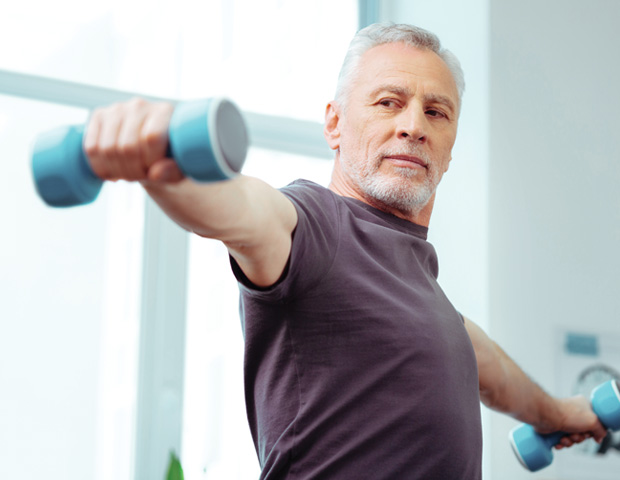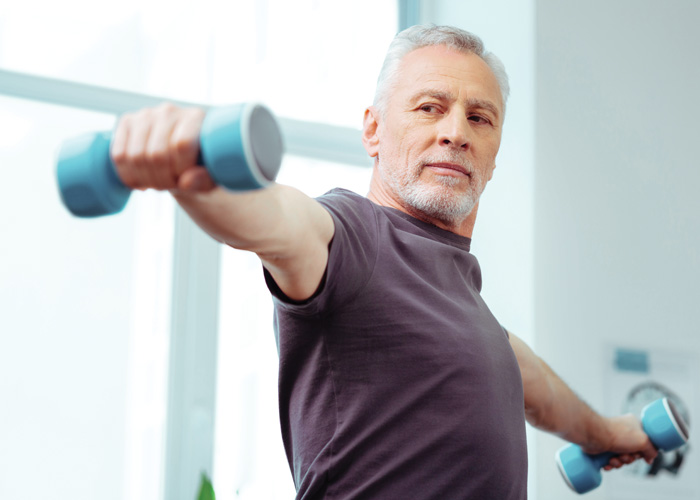In OTC
Follow this topic
Bookmark
Record learning outcomes
Long periods of immobility are a known risk factor for osteoporosis, which affects over three million people in the UK. And staying at home means that customers’ fitness levels could drop if they don’t move around regularly
Whether people are social shielding, isolating or just staying at home during the coronavirus pandemic, they should take action to look after their bone health and reduce their risk of breaking a bone, according to the Royal Osteoporosis Society (ROS). The Society says that pharmacy teams are well placed to offer bone health advice to customers, especially those who have already been diagnosed with osteoporosis or low bone density (osteopenia).
Weight-bearing and muscle-strengthening exercises are particularly important for bone health, and the Chartered Society of Physiotherapy recommends activities such as stair climbing, walking around the house or other adapted activities. According to Tim Allardyce, consultant physiotherapist and osteopath at www.rehabme.com, increased weight-bearing activities can have a significant impact on reducing osteopenia and slowing its development. “While social isolation is totally necessary, we are becoming concerned with the lack of exercise that people are getting while being at home,” he says. “There has never been a more important time to look at home-based exercises for good bone health. Weight-bearing and bodyweight exercises are very important to maintain muscle strength.”
Although customers can’t get to physiotherapy appointments at the moment, they may be offered remote consultations. It is essential they continue with recommended exercises to keep their muscles, bones and joints strong. This, along with making simple changes at home, will reduce the risk of falls. “Check for anything they could trip over (rugs, for example),” says Dr Deborah Lee at Dr Fox Online Pharmacy. “They should also look after their feet, so their toenails are short, and they fit comfortably in shoes or slippers with a non-slip sole.”
There has never been a more important time to look at home-based exercises for good bone health
Tim Allardyce’s top five exercises for the over-70s
Sit to stand: Sit upright with good posture, and place your hands on the sides of the chair. Gently lean forwards and use as much leg strength as you can to push yourself up. Use your hands and arms to assist. Once upright, stand up straight. When you feel comfortable, slowly sit back down, guiding yourself by using your arms. Try to keep a straight spine during sitting rather than letting your back round forwards too much. This exercise will strengthen your legs and core. Repeat 10 times, twice a day.
Step-ups: Stand upright in front of the bottom step of your staircase, holding onto a rail for support. Step up onto the first step with one leg, and bring the other leg to the step to meet it. With control, lower this same foot back to the floor, followed by the other. Repeat 10 times, twice a day.
Single leg balance: Stand on one leg, and try to keep your balance. Be careful and hold onto a wall or table for support when you first start this exercise. This single leg balance helps to strengthen the muscles and ligaments around the ankles and knees and improves balance. Hold this for 30 seconds to one minute each side, and perform once a day.
Wall press-up: Stand upright holding onto a wall or table, and move your leg in front of you at around a 30-degree angle. You will most likely feel a stretch behind the back of your thigh (hamstring) and your thigh muscles working. Repeat 15 times, twice a day.
Marching: Stand upright with good posture, next to a wall or table just in case you need support. March on the spot. Keep your knees up, and move your opposite arm with the opposite knee. Try to stay in exactly the same spot throughout your march. This exercise is good for knee mobility, endurance, balance and coordination. Repeat for two minutes, three times a day.
Vitamin D in the spotlight
According to the ROS, it is important that pharmacy customers make sure they are getting enough vitamin D in their diet (or take supplements as prescribed). Vitamin D is essential for healthy bones, muscles and teeth. It is formed in the body on exposure to sunlight, but due to the coronavirus pandemic, people are spending less time outdoors so their natural levels may dwindle. Public Health England updated its official advice on 23 April (see box).
Pharmacy customers should ensure that they are also getting enough calcium. “Adults following a dairy-free or plant-based diet may need to consider optimising their sources of calciumrich foods,” says Bahee Van de Bor, spokesperson for the British Dietetic Association. “Individuals who are unable to eat enough calcium foods may need to consider a daily supplement. A review with a registered dietitian will help identify the optimal dose of calcium supplements required. In general, adults need approximately 800mg calcium per day.”
Even if customers have a calcium-rich diet (from dairy foods and green leafy vegetables), they need enough vitamin D to make sure calcium is absorbed into their bones and other cells. Food sources alone don’t usually provide sufficient vitamin D, although vitamin D-rich foods include oily fish such as salmon and sardines, cod liver oil, egg yolk and fortified margarines, yoghurts and breakfast cereals.
If customers are concerned about their vitamin D levels while they can’t access their usual GP services, they could use an at-home testing kit. “It’s important to understand baseline vitamin D levels to determine how much supplementation may be required,” says Keeley Berry, nutritional expert and product developer at BetterYou. “As a rule of thumb, I suggest intakes of around 1000 IU of vitamin D for every 25kg of body weight to maintain optimal levels.”
Vitamin D concerns exist at both ends of the age spectrum. Dr Suma Uday, consultant paediatric endocrinologist at Birmingham Women’s and Children’s Hospital, says: “It is critical to consider how the response to containing the spread of Covid-19 could impact our patients. Supporting pregnant women, new mothers and specifically the vulnerable newborn through an anxious and stressful period of selfisolation is crucial. Hospitalisation in infants and children due to hypocalcaemic seizures and rickets are entirely preventable… Reminding the at-risk population of the need for supplementation at each contact is a positive and proactive way for us to make a huge difference to mother and baby.”
To raise help awareness in-store Thornton & Ross has produced a range of educational resources on vitamin D, including a free e-module and a diagnostic toolkit, which can be requested here via fultiumd3@thorntonross.com.
Public Health England vitamin D advice update
- Consider taking 10 micrograms of vitamin D a day to keep your bones and muscles healthy
- This is because you may not be getting enough vitamin D from sunlight if you are indoors most of the day
- There have been some news reports about vitamin D reducing the risk of coronavirus. However, there is no evidence that this is the case
- Do not buy more vitamin D than you need.
Medicines advice
According to the ROS, osteoporosis patients must continue to take their medicines as usual. They may need to speak to their doctor to make sure they can still get injections on time or check whether it is possible to self-administer their treatment. The ROS stresses that:
- Denosumab injections shouldn’t be delayed for more than four weeks as the benefits wear off quickly. The NHS recommends that GPs and hospitals make sure that patients get their treatments on time
- Delaying zoledronic acid infusions or ibandronic acid injections won’t cause bone density to drop significantly or increase the risk of breaking a bone
- A short delay in daily teriparatide injections won’t affect bone health
- If pharmacy customers usually take tablets for osteoporosis, missing a few doses over a few weeks is unlikely to affect their overall bone health. However, they should speak to their doctor
- If customers are prescribed calcium and vitamin D, they must keep taking these supplements, even if their medication is delayed.
Pharmacy customers should be reminded to take osteoporosis medicines as directed. Alendronic acid must be taken first thing in the morning, before eating, drinking or taking other medicines. Patients should remain sitting upright or standing for 30 minutes so that it doesn’t irritate their oesophagus.
“Alendronic acid can cause severe gastro-oesophageal reflux,” says Dr Lee. “Keeping upright is essential to reduce the risk of this happening. Patients can walk around, but shouldn’t bend forwards, for example, to load the washing machine or unstack the dishwasher. They also shouldn’t eat or drink anything until the 30 minutes is up, or take any other medication, including vitamin pills or herbal remedies, at the same time as alendronate.”
Views from the P3pharmacy category panel
Sarina Mughal Day Lewis, London SW1
“Queries about joint pain and concerns about getting enough vitamin D have increased massively during the pandemic, with people not able to get outside much. We have lots of middle-aged customers who want to protect their bones and ask about supplements. Popular brands include Wild Nutrition, Solgar and BetterYou. It’s important to stock a variety of formulations. Most of our customers prefer small capsules, liquid or spray. Keep mouth spray near the till as this is often an impulse purchase. Keep stocks of vitamin D all around the pharmacy.”
Lila Thakerar Shaftesbury Pharmacy, Harrow
“At the moment, vitamin D is really in demand as people are having to selfisolate. We are currently placing all our bone health products on the counter next to the other coronavirus products such as hand sanitiser, so it’s a kind of link selling. Normally, this is a popular category among our over-50s. Lots have been referred by their GPs to purchase vitamin D or calcium supplements. Questions are mostly about the difference between products and which is the best one to take. Health Aid sells well as it is good value and easy to get hold of.”
Gareth Evans Wansford Pharmacy, Peterborough
“We’ve seen a massive increase in vitamin D sales since the start of the coronavirus. Patients are asking for our advice on this topic frequently at the moment. It’s a good idea to keep these products at eye level for your customers so they are easy to spot and reach. This is also a key component of our weight management programme. We stock our own label range of bone health supplements supplied by Premier Health. The Value Pack brand also does well. Most queries are around supplements to support medicines prescribed for bone health.”


